- Home
- Robin McKinley
The Blue Sword d-1 Page 10
The Blue Sword d-1 Read online
Page 10
There were cats too. But these were not the small domestic lap-sized variety; these were as lean and long-legged as the dogs. Their eyes were green or gold or silver, and their coats were mottled brown and amber and black. One animal looked almost spotted, black on brown, while the next looked almost striped, fawn-pale on black. Some wore collars, leather with silver or copper fittings, but no leashes, and each went its solitary way, ignoring any other cats, dogs, or horses that might cross its path. One came over to Harry where she stood; she held her breath and thought of tigers and leopards. It viewed her nonchalantly, then thrust its head under her hand. It was a moment before Harry recovered herself enough to realize that her hand was trembling because the cat was vibrating as it purred. She stroked it gingerly and the purr grew louder. The fur was short and fine and very thick; when she tried, delicately, to part it, she could not see the skin. The cat had very long blond eyelashes and it looked up at her through them, green eyes half closed. She wondered how all the animals got on together: were there ever any fights? And did the big cats ever steal one of the green-and-blue parrots that rode on a few of the Hillfolk's shoulders?
The tents were all down, and she was amazed at the numbers of beasts and people that were revealed. She wondered if the people were all men but herself, thinking of the attempt by the men of the household to wait on her at her bath the evening before. She could not tell, now, by looking, for everyone wore a robe similar to her own, and most wore hoods; and only a few wore beards.
"Lady," said a voice she knew, and she turned and saw Corlath, and Fireheart followed him.
"Another long ride?" she said, feeling a flush in her cheeks for being called lady by the Hill-king.
"Yes, another long ride, but we need not travel so quickly."
She nodded, and a smile came and went on the king's face, so quickly that she did not see it, as he realized that she would not plead, nor ask questions. "You will need this," he said, and handed her a hood like the one he and most everyone else were wearing. She stood turning it over helplessly in her hands, for it was little more than a long tapered tube of soft material, and not too plainly meant as one thing or another to someone who had never seen one before. He took it away from her again and put it on her, then produced a scarf and showed her how to wrap it in place. "It grows easier with practice," he said.
"Thank you," she said.
Another voice spoke behind them, and both turned; a man stood with another horse at his heels. This man was dressed in brown, and wore leggings and a tunic above his tall boots and bore a small white mark on his right cheek; and Corlath told her that so the men of the horse, the grooms, dressed; men of the hunt, who cared for the cats and dogs, were dressed similarly, but their belts were red, and they wore red scarves over their hoods and their white mark of office was on the left cheek. "I—I thought all the Hillfolk wore sashes," Harry said hesitantly. "No," Corlath answered readily enough; "only those who also may carry swords."
The brown-clad man turned to the horse he had brought them. "His name is Red Wind, Rolinin," Corlath said; he was another red bay, though not so bright as Fireheart. "For the present, you will ride him."
She speculated, a little nervously, about the for the present. She was pleased at the idea of not bumping on somebody else's saddlebow, but as she looked up at the tall horse, and he looked kindly down on her, she collected her courage and said, "I—I am accustomed to bit and bridle." She thought, I am accustomed to stirrups too, but I can probably cope without them—at least if nothing too exciting occurs. He looks like he'll have nice gaits … Oh dear.
"Yes," said Corlath in his inscrutable voice, and Harry looked up at him in dismay. "Red Wind will teach you how we of the Hills ride."
She hesitated a minute longer, but couldn't think of anything further to say that wouldn't be too humiliating, like "I'm scared." So when the brown man went down on one knee and cupped his hands for her foot, she stepped up and was lifted gently into the saddle. No reins. She looked at her hands as if they should be somewhere else, rubbed them briefly down the legs, and then laid them across the rounded pommel like stunned rabbits brought home from a hunt. Red Wind's ears flicked back at her and his back shifted under her. She closed her legs delicately around his barrel and he waited, listening; she squeezed gently and he stepped gravely forward; she sat back and he stopped. Perhaps they would get along.
Corlath mounted while she was arranging her hands; I suppose they'll expect me to learn to mount without help too, she thought irascibly; when she looked up from Red Wind's obedient ears Fireheart moved off, and Red Wind willingly followed.
They traveled for some days. She meant to keep count, but she did not have the presence of mind immediately to find a bit of leather or rock to scratch the days on as they passed, and somewhere around four or five or six she lost count. The days of travel continued for some time after the four or five or six; every muscle in her body ached and protested from the unaccustomed exercise, after months of soft living at the Residency and aboard ship. She was grateful for her weariness, however, for it granted her heavy sleep without dreams. She developed saddlesores, and gritted her teeth and ignored them, and rather than getting worse as she had expected, they eased and then went away altogether, and with them the aches and pains. Her old skill in the saddle came back to her; she did not miss the stirrups except while mounting—she still needed someone to be a mounting-block for her every day—and slowly she learned to guide her patient horse without reins. She could bind her boots to her legs and her hood round her head as deftly—almost—as though she had been doing these things all her life. She learned to eat gracefully with her fingers. She met four women who were part of Corlath's traveling camp; they all four wore sashes.
She learned the name of the friendly cat: Narknon. She often found her keeping her feet warm when she woke up in the morning. Narknon also, for all her carnivorous heritage, had a taste for porridge.
Harry continued to eat at the king's table for the evening meal, with the eighteen Riders and Corlath; she still sat at the king's left hand, and she was still politely served and equably ignored. She began to understand, or at least to suspect, that Corlath kept her near him not only because the Hillfolk were not accustomed to dealing with enemy prisoners, but more because he was hoping to make her feel like a respected guest—he was quick to answer her questions, partly perhaps because she did not abuse the privilege; and there was often almost diffidence in his manner when he offered her something: a new cloak, or a piece of fruit of a sort she had never seen before. He wants me to like it here, she thought. She still slept in the king's tent, but a corner was now modestly curtained off for her, and when she woke in the morning and put the curtains back, Corlath was already gone. One of the men of the household would see her, and bring her towels and water, and breakfast. She grew fond of the porridge; sometimes they made it into little flat cakes, and fried them, and put honey over them. The honey was made from flowers she had never seen nor smelled; the rich exotic fragrance of it set her dreaming.
She never asked Corlath why she was here, or what her future was to be.
In the mornings, after breakfast, while the camp was broken, or, if they were staying an extra day while messengers came from nowhere to talk to the king, she rode Red Wind and, as Corlath had told her, taught herself, or let the horse teach her, to ride as the Hillfolk rode. After her riding-lesson, if they were not traveling that day, she wandered through the camp, and watched the work going forward: everything was aired and washed or shaken out or combed, and the beasts were all brushed till they gleamed. No one, horse or dog or cat or human being, ever tried to stop the Outlander from wandering anywhere in particular, or watching anything in particular; occasionally she was even allowed to pick up a currycomb or polishing-cloth or rug-beater, but it was obvious that she was so permitted out of kindness, for her help was never needed. But she was grateful for the kindness. She spoke her few words of Hill-speech: May I? And Thank you, and the Hillfolk smile
d at her and said, Our privilege, slowly and carefully, back to her. Sometimes she watched the hunts ride out; the dogs hunted in their groups, the cats alone or occasionally in pairs. There did not seem to be any order to those who rode with them, other than the presence of at least one man of the hunt; and she never saw any return without a kill: desert hares, or the small digging orobog—Corlath told her the names—or the great horned dundi that had to be hung on a pole and carried between two horses.
She was homesick in unexpected spasms so strong that Red Wind, who was a faithful old plug by Hill standards and could be trusted to children and idiots, would feel her freeze on his back, and toss his head uncomfortably and prance. She had not wept herself to sleep since her first night in the king's tent and she thought, carefully, rationally, that it was hard to say what exactly she was homesick for: the Homeland seemed long past, and she did not miss her months at the Residency in Istan. She recalled the faces of Sir Charles and Lady Amelia with a pang, and she missed her brother anxiously, and worried about what he must think about his lost sister. She found she also missed the wise patient understanding of Jack Dedham; but she thought of him with a strange sort of peacefulness, as if his feeling for his adopted country would transcend the seeming impossibility of what had happened to her, and he would know that she was well. That sickness of dislocation came to her most often when she was most at ease in the strange adventure she was living. She might be staring at the line of Hills before them, closer every day, watching how sharply the edges of them struck into the sky; Red Wind at Fireheart's heels, the desert wind brushing her cheek and the sun on her shoulders and hooded head; and suddenly she would be gasping with the thing she called homesickness. It would strike her as she sat at the king's table, cross-legged, eating her favorite cheese, sweet and brown and crumbly, listening wistfully to the conversation she still could not understand, beyond the occasional word or phrase.
I'm missing what I don't have, she thought late one night, squirming on her cushions. It's nothing to do with what I should be homesick for—Jack would understand, the oldest colonel still active, looking across the desert at the Hills. It's that I don't belong here. It doesn't matter that I'm getting burned as dark as they are, that I can sit a horse all day and not complain. It doesn't matter even that their Water of Sight works in me as it does in only a few of their own. It is only astonishing that it would work in one not of the Hills; it does not make that one any more of the Hills than she was before.
There was a certain bitter humor to lying awake wishing for something one cannot have, after lying awake not so long ago wishing for the opposite thing that one had just lost. Not a very useful sort of adaptability, this, she thought. But, her thought added despairingly, what kind of adaptability—or genius—would be useful to me? She traced her life back to her childhood, and for the first time in many years recalled the temper tantrums that she had grown out of so early it was hard to remember them clearly; but she did remember that they had frightened even her, dimly, still a baby in her crib, realizing there was something not quite right about them. They had scared two nursemaids into leaving; it had been her mother who had at last successfully coped, grimly, with her and them. That memory brought into focus another memory she also had pushed aside many years ago: the memory, or knowledge, of not-quite-rightness that grew up after the tantrums had passed; and with that knowledge had also grown an odd non-muscular kind of control. She had thought at the time, with a child's first wistfulness upon being faced with approaching adulthood, that this was a control that everyone learned; but now, lying in the desert dark, she was not so sure. There was something in her new, still inexplicable and unforeseeable life in the Hills that touched and tried to shape that old long-ignored sense of restraint; and something in her that eagerly reached out for the lesson, but could not—yet—quite grasp it or make use of it. There was, too, a reality to her new life that her old life had lacked, and she realized with a shock that she had never truly loved or hated, for she had never seen the world she had been used to living in closely enough for it to evoke passion in her. This world was already more vivid to her, exhilaratingly, terrifyingly more vivid, than the sweet green country, affectionately but indistinctly recalled, of her former life.
She did not have much appetite for breakfast the next morning, and fed hers to Narknon, who gave a pleased burp and went back to sleep again till the men of the household routed her out when they took down the king's tent. They were nearly to the foothills by the time they halted that evening. The scrub around them had begun to produce the occasional real leaf, and the occasional real leaf was green. For the first time, there was an open stream that ran past their camp, instead of the small secret desert springs; and Harry had a real bath in the big silver basin for the first time since her first evening with the camp, for there had been little water to spare since then. This time the men of the household left towels and a clean yellow robe for her, and left her, as soon as her bath was full.
They made camp behind a ridge that ran into what was certainly itself a hill. The tents were pitched around a clear space at the center, with the king's tent at one edge of it. That clear space always held a fire in the evenings, but tonight the fire was built up till it roared and flung itself taller than the height of a man; and as everyone's duties were completed, all came and sat around it till they ringed it. The dogs' pale coats turned red and cinnamon in the firelight; the cats' shadowy pelts were more mysterious than ever. The wall of the king's tent facing the fire was rolled up, and Harry and the king and his Riders sat at the open edge and stared at the fire with the rest.
After a time no more dark figures came to join the circle; the fire shadows fell and sidled and swam so that Harry could not guess how many people there were. The fire itself began to burn down till it was no more than the kind of glorious bonfire she and her brother had had now and again when they were children and the weather and their parents' mood had conspired together in their favor.
Then the singing began. There were several stringed instruments like lutes, and several wooden pipes for accompaniment and harmony. She recognized ballads even when she could not understand the words, and she wished again that she could understand, and fidgeted on her rug, and glanced at Corlath. He looked back at her, intercepting her frustration, and while there was nothing particularly encouraging about that look, still there was nothing particularly discouraging about it either—as was usual with the looks he gave her now; as was also usual, there was an edge of wistfulness, or sheepishness, in his glance. He had either lost or, as she thought more likely, learned to restrain the slightly resentful puzzlement she had seen the night she had drunk the Water of Sight. She stood up and went over to him and sat down beside him, and pulled up her knees and put her chin on them and stared at the fire, and listened to the words she could not understand. She knew that there had to be at least one more person in the camp who spoke Homelander, the man who had acted as Corlath's interpreter—and, as Peterson had guessed, unnecessarily—at the Residency, but she had never learned who that man was. Someone else who might have spoken to her, and taught her some more Hill words, that she might be able to talk to those around her—might be able to translate the words of the songs they were singing now. But someone who had chosen not to make himself known to her; someone who liked his skill so little that he felt no pity for her isolation: she, an Outlander, who did not belong to the desert and the Hills.
Corlath was watching her face as these thoughts went through her mind, and perhaps he read something of them there, for he said without prompting: "They sing of what is past, hundreds of years past, when the possession of kelar was so common it was hardly thought a Gift, any more than the length of your nose is a Gift.
"Those given the kelar are far fewer today than they were then. I—we—believe that we are soon to learn at our gravest cost the worth of what we have lost."
He thought, wearily, looking at her and unable to read her expression, What does she see? What do we
look like to her? And with a flash of anger he thought, Why is it so arranged that I must hope for the comprehension of an Outlander? Why must it be an Outlander who carries so precious a Gift? A Gift she may choose to repudiate or—or use against us, who need the strength so sorely? Harry hugged her knees closer, and for a moment she saw again a bright narrow thread of riders trotting up a mountain way. So I have the Gift, she thought, but of what use is it to see uninterpretable visions? She came back to herself as Corlath said: "We sing because we have returned to our Hills; tonight is the first night we sleep again in their shadow.
"Listen. They will sing a ballad of Lady Aerin, Dragon-Killer." Harry listened, listened hard, with the muscles of her back and of her thighs, as if the Hill-speech were a fractious horse she might tame; and out of the firelight came a figure, wavering with the leap and flicker of the flames, and with hair that was fire itself. A tall broad-shouldered figure with a pale face, and in its right hand it held a long slim blade that glittered blue. Harry stared till her eyes felt as dry as sand, and then the figure's face swam into focus, and it was a woman's face, and it smiled at her. But it didn't smile, it grinned, the wry affectionate grin of an elder sister; and Harry's head swam with love and despair. Then the woman shook her head gently, and her aureole of hair flamed and rippled about her, and she reached out her empty left hand, and Harry found herself on her hands and knees, reaching her hand back. But a gust of wind came from nowhere and whipped the fire as though it were an unruly dog, and the figure vanished. Harry fell where she had knelt, and pressed her face to the earth. One real dog sat up and howled.

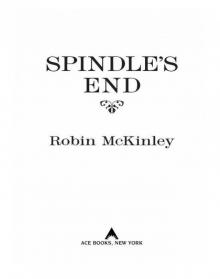 Spindle's End
Spindle's End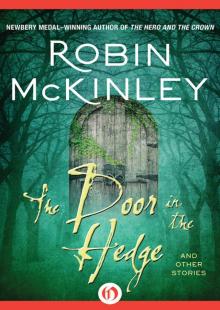 The Door in the Hedge: And Other Stories
The Door in the Hedge: And Other Stories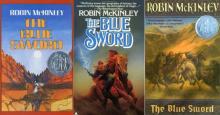 The Blue Sword
The Blue Sword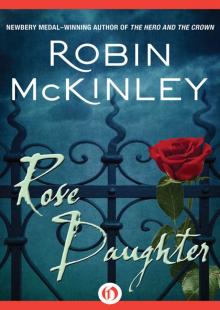 Rose Daughter
Rose Daughter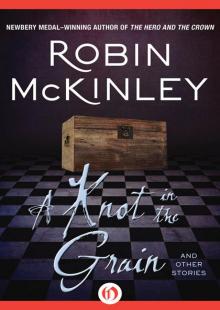 A Knot in the Grain and Other Stories
A Knot in the Grain and Other Stories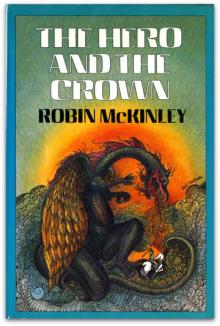 The Hero And The Crown
The Hero And The Crown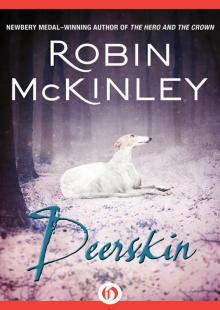 Deerskin
Deerskin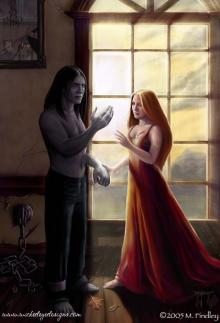 Sunshine
Sunshine Beauty: A Retelling of the Story of Beauty and the Beast
Beauty: A Retelling of the Story of Beauty and the Beast Shadows
Shadows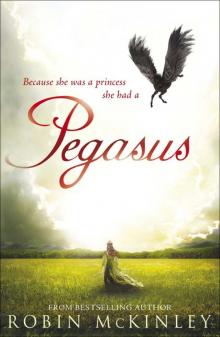 Pegasus
Pegasus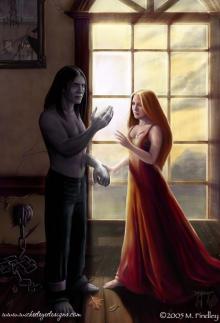 Chalice
Chalice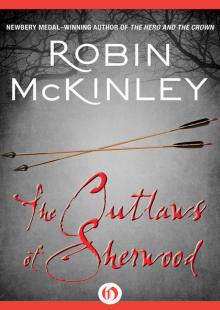 The Outlaws of Sherwood
The Outlaws of Sherwood Fire: Tales of Elemental Spirits
Fire: Tales of Elemental Spirits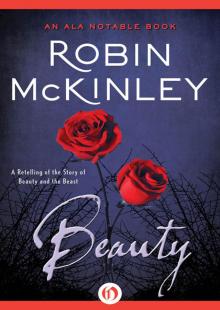 Beauty
Beauty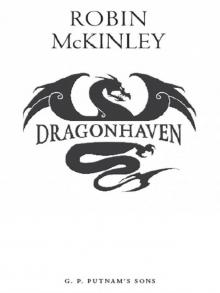 Dragon Haven
Dragon Haven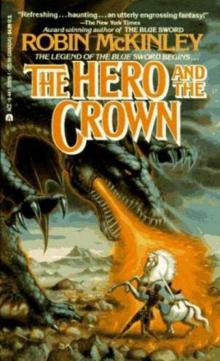 The Hero And The Crown d-2
The Hero And The Crown d-2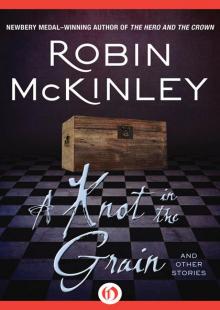 A Knot in the Grain
A Knot in the Grain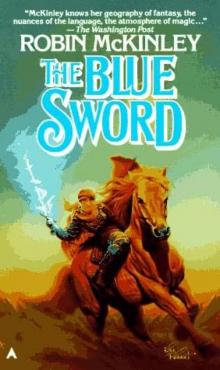 The Blue Sword d-1
The Blue Sword d-1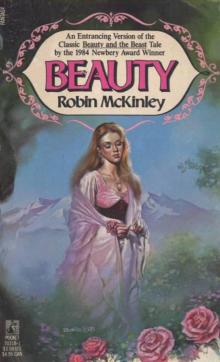 Beauty (v1.2)
Beauty (v1.2)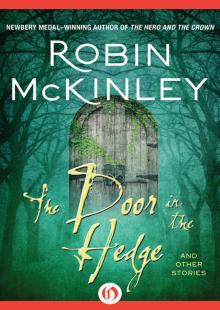 The Door in the Hedge
The Door in the Hedge